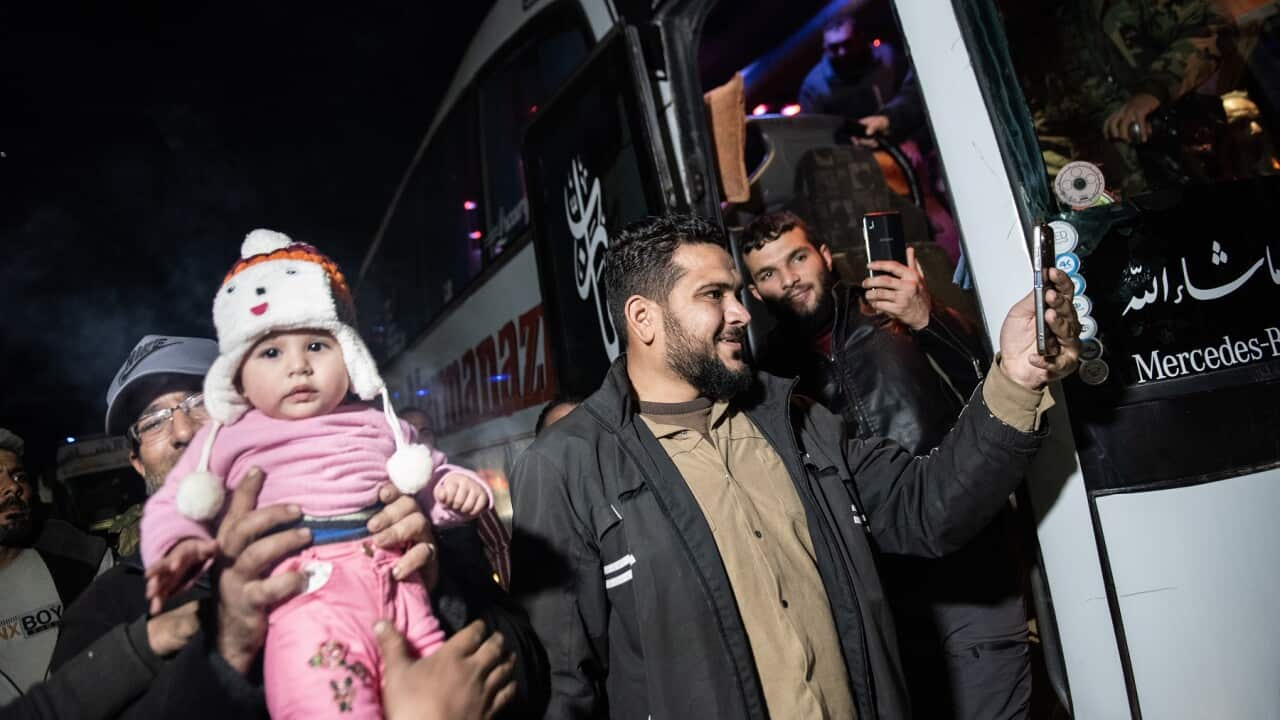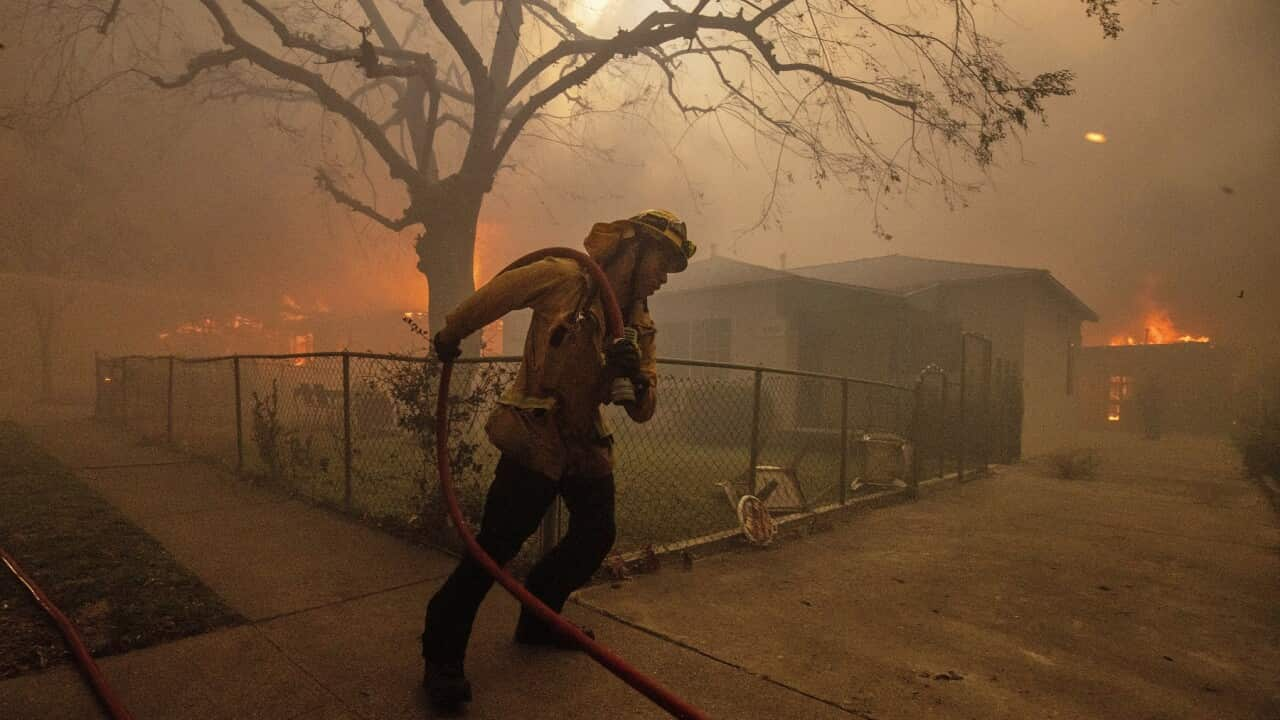TRANSCRIPT
In an incredible feat of survival, 23 year-old Hadi Nazari was rescued after 13 days, lost in the dense bushlands of New South Wales' Kosciuszko National Park.
His cousin, Hussain Ali, spoke outside the hospital in Cooma where Mr Nazari was transported to safety, expressing his relief his cousin was found in relatively good health.
"I was the first person he saw me, he just came out and ran towards me and hugged me. And we were all surprised and shocked at how fit and healthy he was after 13 days. We were sure that he is a fighter, he will fight until the end. We had faith in God that he will be fine."
Prime Minister Anthony Albanese was ecstatic over the news.
"It is remarkable. And I just think everyone will have jumped for joy, the whole nation, at this news. And I look forward to reading more about the story, perhaps seeing the movie, the documentary, the other info that will come out of this. It is quite remarkable."
A group of hikers found Mr Nazari near Blue Lake, about 10 kilometres from where he was last seen on the Hannels Spur Trail in Geehi [[jee-high]] on Wednesday afternoon, and contacted emergency services.
Mr Nazari had not been seen since he began descending the challenging Hannels Spur track in Kosciuszko National Park at about 2.30pm on December 26th, and failed to meet up with his friends at the campgrounds.
With him on his person he had: a small water bottle, a tent, a sleeping bag and his camera.
One of the hikers who found Mr Nazari, Ty Pareskevopoulos, gave a statement to SBS saying he and two of his mates spotted Mr Nazari far down the mountain, where he was yelling and asking them what the date was.
He says Hadi responded saying he thought he had only been missing for six days.
Mr Pareskevopoulos said they rushed down the mountain to give him water and food, and that Hadi's reaction was happiness mixed with exhaustion, and worry for his family.
He added that they were so grateful, happy and overwhelmed to have found him.
Superintendent Andrew Spliet says Mr Nazari found a hiker's hut in the mountain, found and ate two muesli bars and foraged for berries over the 13 days he was lost.
Caro Ryan is Deputy Unit Commander for New South Wales SES Bush Search and Rescue and was part of the massive search operation, involving hundreds of emergency workers.
Ms Ryan says she couldn't hold back her emotion upon hearing the news.
"I cannot describe the excitement and just the overflowing emotions that came from not only me, but I'm sure it was everyone else on the team. When I heard, I jumped on the phone to some of the SES members who'd been on the search for the longest number of days, some of them staying out overnight for two, three nights up in the bush and there were tears. There were definitely some tears when we heard about Hadi being found and just tears of happiness. Just so great to have a good outcome to bring him home to his family. And also we've been thinking the whole time about his two friends and what they must've been going through. So (I) cannot even begin to tell you how great that was."
One woman who knows plenty about how to survive in the bush is Gina Chick - winner of the inaugural season of Alone Australia, after spending a staggering 67 days enduring Tasmania's wilderness.
She says the news of Hadi's survival is incredible.
"So I'm thrilled because so often these stories don't end well. Probably apart from the physical skills, what happens when people get lost in the bush is a very sort of primal panic takes over. And we see highly intelligent people will suddenly just start running with no idea where they're going in a panic into the bush and get themselves into real strife. Being lost - if you've never been lost, it can be the most discombobulating thing. So it sounds like he's managed that because he's done some very sensible things."
In fact, Gina Chick says mental resilience is perhaps the key factor affecting an individual's ability to survive.
"I think it's different for, we all have the point that is our edge, and for one person it might be just walking barefoot in their front yard. For someone like me, it's 67 days in the wilderness. But when we get to that edge and go over it, we discover parts of ourselves that we didn't know are there, and then we have to draw on our resilience and our ability to be with discomfort. To find that point of discomfort and find a way to be at peace with it. A way to be at peace with discomfort, because we live in a society that pathologises discomfort, so we think it's wrong. If I'm feeling uncomfortable, there must be something wrong. And that can be when the fear kicks in."
Rick J Peterson is a bushcraft and survival instructor based in Queensland, and was also a contestant on season 2 of Alone Australia.
He agrees mental strength is essential to surviving if lost in the bush.
"You could be equipped with all of the fancy survival gear you like, but if your attitude of giving up or quitting with the first couple of nights of no shelter... It's dark, if you couldn't get a fire going - which I'm not sure of the circumstances there, I'd be interested to find out - but if it was dark and your headspace starts to play games with you, and if you can't keep control of that, none of the other equipment is good."
Especially, he adds, when it can be a matter of minutes before someone finds themselves detached from their group and disorientated.
"It's often a series of small mistakes. And I'm never here to point the finger to anybody because none of us know Hadi's situation. And it's a simple thing of leaving a group. And it might be that you've left your backpack with the group, you're just walking in to take a photograph, get disorientated. It could be a bit overcast, could be any number of things. And before you know it, your circumstances are very different. So without knowing all the circumstances, he's done well. And it would've had to have been his mindset of just not giving up. There might be some other mistakes he's made, but his mindset ultimately has kept him not giving up."
But there are some key decisions which likely contributed to Hadi's survival, as Mr Peterson describes.
"Whatever his biggest threat was, if it's the heat, then get out of the heat. If it's needing water, then address that priority with the acquisition of water. I often think luck favours the prepared and having - look, I've got a table behind me, I'm just about to run a workshop. But on the very left hand end typically are the highest priority things. And it could be something as simple as having a pouch that's got high retro reflective gear in it. It could be a help blanket, it could be something that doesn't take much room, just a piece of clothing that's bright for a start."
Gina Chick agrees there's an important order of priorities, and food is much lower down on the list than most people realise.
"In the lineages that I've been taught in, the order of survival is you need shelter first because you're going to die fastest without shelter. Hypothermia can kill you in three hours. You need water because in three days without water you're cactus, you're dead. You need fire or warmth, a way of keeping your calories up, a way of keeping yourself warm, again so you don't get hypothermia, and so fire. But anyway, basically anything in shelter is going to keep you warm. And then food is the very last thing on the list. And it's funny because people think of food first and I've heard conversations around out and about people saying, oh my goodness, he went two weeks without food. It's amazing how long we can actually survive without food. I think I went for about three weeks on Alone before I had my first food."
New South Wales SES commander Ms Ryan says preparation can not only increase your chances of survival, but also guarantee a more enjoyable bushwalking experience.
"When you do go out on a bushwalk or hike, you kind of can be so focused on, I just want to get out in the bush, want to be hanging out with my mates. One thing, always go out with friends, go out with other people. But it's so easy to skip over that really essential planning and preparation phase. It sounds all a bit boring really, but actually it's the stuff that sets you up not only just to keep you safe, but to give you a great time in the bush. This is what you want. You actually want to have a really good experience."
She refers to a helpful acronym TREK - where the 'T' stands for 'take what you need', in particular food, water, warm layers and a first aid kit.
The 'R' stands for 'register your intentions', or in other words, tell someone where you are going, while the 'E' stands for emergency communication, or ensuring you have a device that allows you to contact emergency services.
And finally, the 'K' stands for 'know your route', and ensure you plan your hike according to your skill level.
But if you do happen to find yourself lost, Ms Ryan says once you have calmed yourself down, there are some handy strategies that can help you either self-rescue or have a greater chance of receiving help.
"Everyone's choices and decisions are going to be different, but the big number one thing is if you need to call for help, call for help. In fact, a great quote I heard from Sergeant Dal Atkinson up here in the Blue Mountains was, if you think you need to call for help, you probably do, and there is no shame and there is no embarrassment in doing that. One thing that Hadi made a great choice is that he knew that water was a key to his survival, and that to me speaks volumes in terms of the number of days that he was out there. So having access to water, and that was where the clues that we were finding some of his items that were discovered by our search crews was in creek lines. Staying put, setting up camp, keeping safe, and making yourself visible."
These small but vital steps can be the difference between death and survival, according to Mr Peterson.
He says one of the biggest mistakes hikers can make is failing to tell either their group or others where they are going.
"As soon as you get to the point where you realise this is not making sense, I don't know where I am, don't keep walking. It can end up being the difference between people standing around your grave site and people finding you returning home with a heartbeat. If you're lost, don't keep walking."
Mr Peterson says he wishes more people were educated in how best to prepare and survive in the Australian bush.
But referring to his own acronym for survival, he says there's one thing that would have kept Hadi persevering.
"And I often say under one of the letters, V is value living. And I dare say Hadi has got a beautiful family and community around him that would not give up on him. And if he knows they won't give up on me and they won't believe I'm a quitter, that gives him that internal strength to go, okay, if they're not going to quit on me, there's no way I'm quitting on them."













